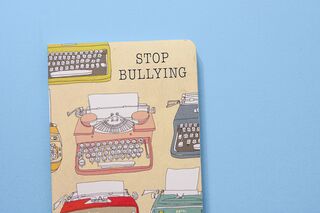Bullying
Entitlement and Bullying in the Classroom and Beyond
Tips for dealing with bad behavior.
Posted December 1, 2020

A fellow psychology professor recently asked me for advice about dealing with “entitled students and bullies.” I’m not surprised she’s dealing with this early on in her teaching career and at this point in the semester, as students are starting to realize what their final grades will be. From open disdain to social media posts to full-on threats of violence, ask any professor, and I’m sure you’ll get quite the story.
Thankfully, those who study education have slowly but surely been putting out articles on the topic. In psychology (and related fields), we have particular insight about this. It’s behavior that reflects larger social norms, and the solutions apply beyond the classroom. Here’s my advice:
1. Call them out. Accountability is key. Sure, some are “looking for a fight,” but even the ones who roll their eyes and whisper are negatively impacting the classroom climate. Some colleagues say they don’t notice or it doesn’t bother them. Others say they don’t want to make enemies or legitimize the behavior by acknowledging it.
While I understand, to me, it’s like parents fighting in the other room and thinking their kids don’t notice. They do. Outside of the classroom, we call this being an active bystander. I almost cheered when one student complained about chronic whisperers, saying, “They might not care about their classes, but I’m not here to waste my time.”
Some students may not want to learn, but the rest do. Use your judgment here—you’re the expert on class climate, and the way you call it out matters. Certainly, no one wants a class that feels like endless interruptions and scolding.

2. Conduct corrective action. Take it step-by-step and start small (unless the behavior is violent or egregious). Even with calling students out, I take it step-by-step. Most of the time, it only takes looking at them for more than a second (harder in an online environment). They know. Some might stare back defiantly, but in my experience, most stop.
If the behavior persists, work up to what you need to do. Separate them, talk to them one-on-one, review the student code of conduct… you know, basically be a high school teacher (I hear you). If I have to call someone out, I am sure to tell them I don’t get any joy out of calling people out (I truly do not—I’d rather teach), but their behavior was distracting, inappropriate, whatever. The thing I like about corrective action, a management tool, is that it usually prevents things from getting worse in any context.
3. Speaking of high school teachers, they must understand adolescent development. A lot of our students are still developing and are, technically, adolescents. When teaching about brain development, I always tell my students (as some sigh and roll their eyes) that I worked with a pediatrician who would see patients up to 26 years old. “Their brains are still developing,” she’d explain. We know that areas like the prefrontal cortex need a lot of time to fully develop for things like perspective-taking and decision making.
Honestly, some of our students, and maybe even our friends and co-workers, just aren’t there yet. It doesn’t make it any easier or take away the need for accountability, but we are in a profession that seeks to understand, right?

4. Be curious. I can’t tell you how many times people have told me, “It’s not about you.” Yeah, that’s a possibility. It’s also a possibility that you are, indeed, the stimulus that leads to the inappropriate response.
So while I validate any “Why TF won’t you just let me teach?!” reaction, I also try to sit in a place of curiosity. Really, what could be going on with them? They could be ruthless bullies, but they could also be suffering from severe insecurity and anything in between. It absolutely sucks to be the target, but even when it’s cruelty directed at you, it helps to try to learn something from the situation (even if that’s just your own boundaries or how the administration will respond).
5. Know you’re awesome. Something I’ve always found as a small woman, but especially as I get older, is that students challenge my authority and expertise. It’s a constant fight to be respected. Another small woman colleague, a well-known gender studies professor, told me once during coffee, “Ashley, as soon as they see us walk into the classroom on the first day, we are ‘bitches.’”
Most articles I’ve read about student bullies and academic contra power harassment address the gendered component, and some include race, but I haven’t seen much about age. You certainly can look “too young” and “too old” to be respected. I’ve watched countless students question my older colleagues, suggesting they’re too old to “get it” anymore.
But here’s the thing: You know your stuff. Even if you trip over your words during a lecture or don’t know the answer to a student’s question because you’re a human being, there is a reason you were hired. Plus, while I understand the impact of just one or two disruptive students, I’m sure there are many more in class who think you’re a great instructor... or customer service rep, or whatever applies to you here. Remember, those with negative feedback are always, always the loudest.

6. Debrief. When bullies are targeting you, it’s easy to turn inward, blame yourself, or try to figure out what you’re doing wrong. You deserve support, and many of us are here to give it.
Sure, get to know your colleagues and their capacity to take this on, but in general, let it out. Share. That’s how I learned I wasn’t the sole target. By talking to my colleagues, I also get a chance to explore other perspectives and solutions.
The above was prompted by a specific educator’s question, but the advice applies beyond education. Most of us who have experienced harassment, abuse, entitlement, and bullying will go out of our way to keep our friends and colleagues from having to go through it too. Let’s talk.




